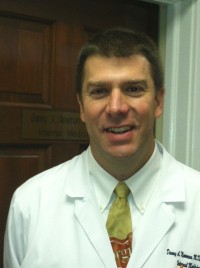Dr. Danny Newman, like other physicians, recognizes that electronic health records are here to stay.
Newman, an Augusta internist, has seen some of the benefits of replacing paper medical records with computerized data. One advantage, he said, is electronic prescribing of medications, which reduces mix-ups caused by unclear handwriting.
But Newman isn’t thrilled with electronic health records (EHRs) as they now exist. He said the current versions are primarily geared to billing and reimbursement, rather than focused on care for the patient.
“They’re supposed to be more efficient,’’ Newman told GHN on Thursday, “but I think they’re less efficient.”
A patient visit now produces five pages of notes, instead of a single page in the pre-EHR days, he said. And it takes about five minutes to fill in the EHR for one visit. “It’s taking away time from my patients,” Newman said.
Nowadays, he added, many doctors “feel like they’re data entry clerks.”
Earlier this month, the American Medical Association gave official voice to physician frustration with computerized records. It called for improvements to EHR systems to benefit caregivers and patients.
“Physician experiences . . . demonstrate that most electronic health record systems fail to support efficient and effective clinical work,” AMA President-elect Dr. Steven J. Stack said in a statement. “This has resulted in physicians feeling increasingly demoralized
by technology that interferes with their ability to provide first-rate medical care to their patients.”
The AMA outlined eight “priorities” to improve the data systems for doctors and patients.
‘Meaningful use’
Proponents point out that electronic health records can improve coordination of medical care, reduce errors and unnecessary duplication of tests, provide better research data, and engage patients and families in their care.
Medicine was slower than other industries, such as banking, to convert to paperless systems. But EHR use in doctors’ offices has surged over the past few years.
The growth coincides with Medicare and Medicaid paying incentives for hospitals and doctors to demonstrate “meaningful use” of electronic health records to improve patient care.
Last year, U.S. Health and Human Services Secretary Kathleen Sebelius said more than half of all doctors and other eligible providers had received Medicare or Medicaid incentive payments for adopting or meaningfully using electronic health records. She said HHS had exceeded its goal that 50 percent of doctor’s offices and 80 percent of eligible hospitals would have EHRs by the end of 2013.
(These goals are supported by more than just incentives. Failure to achieve meaningful use can mean financial penalties for providers. )
The benefits and drawbacks of such systems for physicians can be seen in an AMA/RAND Corp. survey in 2013. It found that 43 percent of physicians reported that using the EHR slowed them down in providing clinical care.
Still, 54 percent of physicians reported that an electronic health record improved communication between doctors and patients outside the clinical visit, and 61 percent reported that an EHR could lead to care improvement.
Too much useless data?
Dr. Jacqueline Fincher, an internist in a small group practice in Thomson, said her office adopted EHRs in 2006. But the current versions of digitalized medical records, she said, appear to be primarily focused on the “meaningful use’’ criteria and regulatory requirements, rather than on actual patient care.
“The recording of so much extraneous information as part of the clinical record is putting so much garbage in the charts that is not medically relevant and makes the important medical information like a needle in a haystack at times,” Fincher told GHN.
“When I review an ER report or other report from another physician or hospital, I just want to quickly and concisely know — why was the patient there and what did you do for the patient. You’d be shocked how difficult and how long it takes to wade through pages and pages of irrelevant information just to get to the important stuff that helps me and others take care of the patient.”
“EHRs should help clinicians in their face-to-face visits, not distract from them.”
The Wall Street Journal recently reported that the U.S. market for EHRs is $9 billion this year. Atlanta and Georgia are hotbeds for companies in the health IT industry.
Health IT experts say the industry has a long way to go, the Journal reported.
“Remember when those first cellphones came out — how big and clunky they were? We are in the clunky phase’’ with EHRs, Lynne Thomas Gordon, CEO of American Health Information Management Association, a professional group, told the newspaper.
‘We’re not there yet’
Dr. Sally Goza, a Fayetteville pediatrician, pointed out that current versions of EHRs aren’t tailored for pediatric practices. She’s a board member of the American Academy of Pediatrics, which is working with a federal health agency to address these documentation gaps.
Despite the imperfections of current electronic systems, Goza said, “I wouldn’t go back to paper.”
The EHR advantages include not having to flip through a pile of paper sheets to find something in a patient’s file. “Everything is right there,’’ she said.
Computers can also give handy reminders to busy doctors. For instance, they can pick up whether a medication interacts negatively with another drug a patient is taking, Goza said.
Goza said she believes an electronic record does take some time away from patient interaction, but that “you can work on it. It takes time to learn how to do it.”
EHRs will evolve and improve, she said. “It should lower costs, if it works the way it’s supposed to. It will help guide care. We’re not there yet.”
Problems at the bottom line
For a small medical office, adopting an EHR is an expensive move.
Dr. Tonya Fordham, a family medicine physician who has a solo practice in Baxley, told GHN recently that she has had an electronic health record for the past seven years. She has received two incentive payments through meaningful use, but that has not covered her costs of implementing the necessary changes.
Despite that, Fordham said she believes electronic medical records are a good idea overall. “I think it will cut down on errors,” she said.
Fordham added that if she can get quicker and better information from specialists who see her patients, “I think it will be great.”
But that kind of electronic coordination among medical providers is often lacking, Newman, the Augusta internist, told GHN. Various hospitals in Augusta each have their own health records system, he said, but “none have the ability to interface with each other. None talk to one another.”
“There needs to be more of a focus on interconnectivity among electronic medical records,’’ he said.
Before installing an EHR in his two-doctor practice, Newman said, he used to dictate his notes to a service that cost about $15,000 a year. That was a much faster system. Between the dictation cost and the spending on EHRs, it’s about a wash financially, he said.
Some physicians now are hiring a “scribe’’ to type in notes during a patient visit, Newman noted. “We’re looking into it,’’ he said.




